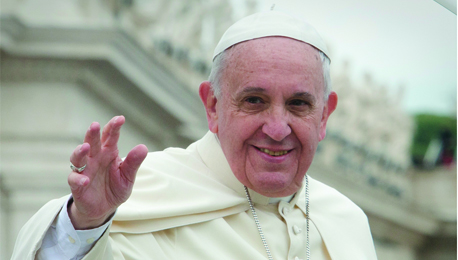Pope Francis published his 2nd encyclical on 18 June 2015, “On safeguarding our common home”, painting a picture without any concessions and calling for a conversion of market laws to serve human beings and all of mankind. Gènéthique is interested in the points corresponding to the bioethical issues that ecology has to take into account.
“When we fail to acknowledge as part of reality the worth of a poor person, a human embryo, a person with disabilities – to offer just a few examples – it becomes difficult to hear the cry of nature itself. Everything is connected”(§ 117) explains Pope Francis in his encyclical, “Laudato si”. A strong text, written following extensive consultation with numerous experts in all four corners of the globe.
“Once the human being declares independence from reality and behaves with absolute dominion, the very foundations of our life begin to crumble for instead of carrying out his role as a collaborator with God in the work of creation, man sets himself up in place of God and thus ends up provoking a rebellion on the part of nature,” continued the Pope before denouncing “a constant schizophrenia wherein a technocracy which sees no intrinsic value in lesser beings coexists with the other extreme, which sees no special value in human beings” (§ 118).
A serious situation requiring fair anthropology to be effective in the battle to safeguard the planet: “Human beings cannot be expected to feel responsibility for the world unless, at the same time, their unique capacities of knowledge, will, freedom and responsibility are recognised and valued”. In this sense, the Pope adopts the thoughts of the Christian tradition as opposed to certain current beliefs which deny human beings their spiritual specificity.
“If the ecological crisis is one small sign of the ethical, cultural and spiritual crisis of modernity, we cannot presume to heal our relationship with nature and the environment without healing all fundamental human relationships,” (§ 119) points out the Pope who, in passing, opposes abortion (§ 120): “How can we genuinely teach the importance of concern for other vulnerable beings, however troublesome or inconvenient they may be, if we fail to protect a human embryo?” And attack the economic liberalism which relativizes the dignity of man, of all men, to market laws and finance: “Is it not the same relativistic logic which justifies the buying of organs from the poor for resale or use in experiments or the rejection of children because they are not what their parents wanted?” (§ 123).
Faithful to himself and to the Gospel, the Pope never loses sight of the poorest people, right at the heart of a commercial society, which he embraces with all its components, offering a summary, which seems to send shock waves across the planet and should impact upon the 21st climate conference to be held in Paris on 30 November 2015.

